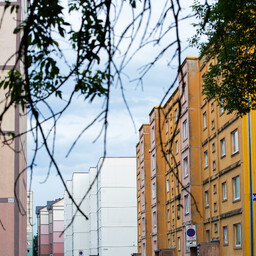Enne sõltus
renoveerimistoetuse saamine
sellest, kui kiiresti taotlus esitati. Nüüd on oluline, kui palju renoveerimine vähendab maja energiakulu. Tänavu suvel jagatakse 80 miljonit eurot toetust.
renoveerimistoetuse saamine
Tõlge fraasile: renoveerimistoetuse saamine
EN
receiving renovation subsidy
Taristuminister Kuldar Leis allkirjastas määruse. Selle järgi on korteriühistutel 30 päeva aega
taotluse esitamiseks
. Pärast seda pannakse majad pingeritta. Toetust saavad esmalt need majad, kus energiakulu on kõrgeim.
taotluse esitamiseks
Tõlge fraasile: taotluse esitamiseks
EN
to submit an application
Kliimaministeerium soovitab korteriühistutel enne taotluse esitamist kontrollida
maja energiamärgise andmed
. Need andmed peavad olema korrektsed.
maja energiamärgise andmed
Tõlge fraasile: maja energiamärgise andmed
EN
building energy label data
Maja energiatarbimine ruutmeetri kohta aastas määrab, kas maja saab toetust. Suurima energiatarbimisega majad saavad toetuse esimesena.
Kliimaministeeriumi asekantsler Ivo Jaanisoo ütles, et oluline on, et
toetusraha läheks sinna
, kus seda kõige rohkem vaja on. Enne jagati toetust kiirelt taotlenud majadele, aga nüüd on oluline energiakulu.
toetusraha läheks sinna
Tõlge fraasile: toetusraha läheks sinna
EN
subsidy money goes where
Jaanisoo rääkis, et Eestis on üle 13 000 maja, mis vajavad renoveerimist. Toetusraha aitab
säästa küttekulusid
ja vältida avariikulusid.
säästa küttekulusid
Tõlge fraasile: säästa küttekulusid
EN
save heating costs
80 miljoni euro suurune toetus tuleb Euroopa Liidu struktuurifondidest ja
CO2 kvoodimüügist
. Majad jagunevad nelja rühma: väikesed, keskmised, suured ja naabruskonnapõhised. Naabruskonnapõhise renoveerimise puhul tuleb lähedalasuvate majade renoveerimine planeerida koos.
CO2 kvoodimüügist
Tõlge fraasile: CO2 kvoodimüügist
EN
from CO2 quota sales
Renoveerimisega on võimalik säästa kuni 60% küttekulusid. Tavaliselt on
toetusmäär 30-50%
. Suuremad toetusmäärad antakse lifti ehitamiseks, väikeste majade renoveerimiseks ja
muinsuskaitsealadel
.
toetusmäär 30-50%
Tõlge fraasile: toetusmäär 30-50%
EN
subsidy rate of 30-50%
muinsuskaitsealadel
Tõlge fraasile: muinsuskaitsealadel
EN
in heritage conservation areas
Mullu oktoobris avatud
taotlusvoor suurtele kortermajadele
ja teatud piirkondade majadele on endiselt avatud. Selle vooru kaudu on toetuse saanud ligi 250 korteriühistut.
taotlusvoor suurtele kortermajadele
Tõlge fraasile: taotlusvoor suurtele kortermajadele
EN
application round for large apartment buildings
Previously, getting a renovation grant depended on how quickly the application was submitted. Now, the focus is on how much the renovation reduces the building's energy consumption. This summer, 80 million euros in grants will be distributed.
Minister of Infrastructure Kuldar Leis signed a regulation. It gives housing associations 30 days to submit applications. After that, buildings will be ranked. Grants will first go to buildings with the highest energy consumption.
The Ministry of Climate recommends that housing associations check the building's energy label data before submitting an application. This data must be accurate.
The building's annual energy consumption per square meter determines whether it qualifies for a grant. Buildings with the highest energy consumption will receive grants first.
Deputy Chancellor of the Ministry of Climate Ivo Jaanisoo said it is important that the grant money goes where it is most needed. Previously, grants were given to buildings that applied quickly, but now the focus is on energy consumption.
Jaanisoo said there are over 13,000 buildings in Estonia that need renovation. The grant money will help save heating costs and avoid emergency expenses.
The 80 million euro grant comes from EU structural funds and CO2 quota sales. Buildings are divided into four groups: small, medium, large, and neighborhood-based. In the case of neighborhood-based renovation, nearby buildings must be planned together.
Renovation can save up to 60% of heating costs. The grant rate is usually 30-50%. Higher grant rates are given for building elevators, renovating small buildings, and in heritage conservation areas.
The application round opened last October for large apartment buildings and buildings in certain areas is still open. Nearly 250 housing associations have received grants through this round.

